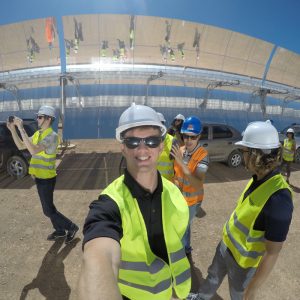
Sustainable development in Morocco
Sustainable development in Morocco is perceived differently than we typically perceive it here in the United States. This difference became apparent in our very first meeting with the MENA Hub Policy organization. The Moroccan view of sustainable development contrasts with our own in that it focuses on the social and economic factors without any regard to the environment. Through my experiences I came to see that the Moroccan view is strictly to meet human development goals through education and political reform. Morocco has vast disparities in wealth and access to education. We saw this first hand in our visit to the village of Tassalmante near Ouarzazate.
Elementary-aged children of this village have to walk over a mile to their school and it is really more of a hike than a walk. They are short on standard school supplies and necessities. When the children get older they face an even further trek to reach high school. MAESN, the Moroccan agency for solar energy, donated bicycles to some of the villages in the area to help kids cover the long necessary distances to get to school but I did not see a single one in the Tassalmante village. There were other villages displaced by the construction of the NOOR facility where I am hoping more of these bicycles may have ended up.
 Our last meeting in Morocco was in Tangier and consisted of a roundtable discussion on sustainable development in Morocco with faculty and graduate students from the Department of Economics and Management at the University Abdelmalek Essaadi. Dr. Abdeljalil Louhmadi highlighted what we had seen throughout our meetings in Morocco. He spoke of the real Morocco and the challenges of dealing with inequity and marginalized people especially those in villages and rural areas. According to him these problems need to be dealt with on a local, regional, national and global level in order to reach a solution. What was also interesting was his mention of the need to professionalize the small farmer. We had a meeting in Marrakech with the High Atlas Foundation and another meeting in Boumia with Hakim Akki where we toured his apple orchards and learned the challenges he faced. A common theme throughout our agricultural meetings was the desire for industrial machines that can be utilized to produce more profitable outputs. For example, apples can be turned into applesauce or apple chips while walnuts can be turned into walnut butter or walnut oil that sell for a higher margin than just apples or walnuts on their own. What was unique about ATLAS is that they are rejuvenating an indigenous knowledge of growing organic walnuts while allowing the people to benefit from the process.
Our last meeting in Morocco was in Tangier and consisted of a roundtable discussion on sustainable development in Morocco with faculty and graduate students from the Department of Economics and Management at the University Abdelmalek Essaadi. Dr. Abdeljalil Louhmadi highlighted what we had seen throughout our meetings in Morocco. He spoke of the real Morocco and the challenges of dealing with inequity and marginalized people especially those in villages and rural areas. According to him these problems need to be dealt with on a local, regional, national and global level in order to reach a solution. What was also interesting was his mention of the need to professionalize the small farmer. We had a meeting in Marrakech with the High Atlas Foundation and another meeting in Boumia with Hakim Akki where we toured his apple orchards and learned the challenges he faced. A common theme throughout our agricultural meetings was the desire for industrial machines that can be utilized to produce more profitable outputs. For example, apples can be turned into applesauce or apple chips while walnuts can be turned into walnut butter or walnut oil that sell for a higher margin than just apples or walnuts on their own. What was unique about ATLAS is that they are rejuvenating an indigenous knowledge of growing organic walnuts while allowing the people to benefit from the process.

